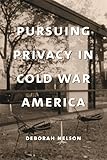Pursuing Privacy in Cold War America / Deborah Nelson.
Material type: TextSeries: Gender and Culture SeriesPublisher: New York, NY : Columbia University Press, [2001]Copyright date: ©2001Description: 1 online resource (232 p.)Content type:
TextSeries: Gender and Culture SeriesPublisher: New York, NY : Columbia University Press, [2001]Copyright date: ©2001Description: 1 online resource (232 p.)Content type: - 9780231111201
- 9780231505888
- American poetry -- 20th century -- History and criticism
- Autobiography in literature
- Cold War in literature
- Confession in literature
- Literature and society -- United States -- History -- 20th century
- Privacy in literature
- Privacy -- United States -- History -- 20th century
- Privacy, Right of -- United States -- History -- 20th century
- Self in literature
- LITERARY CRITICISM / American / General
- 811/.54080355 21
- online - DeGruyter
- Issued also in print.
| Item type | Current library | Call number | URL | Status | Notes | Barcode | |
|---|---|---|---|---|---|---|---|
 eBook
eBook
|
Biblioteca "Angelicum" Pont. Univ. S.Tommaso d'Aquino Nuvola online | online - DeGruyter (Browse shelf(Opens below)) | Online access | Not for loan (Accesso limitato) | Accesso per gli utenti autorizzati / Access for authorized users | (dgr)9780231505888 |
Frontmatter -- Contents -- Introduction:The Death of Privacy -- Acknowledgments -- One. Reinventing Privacy -- Two. "Thirsting for the Hierarchic Privacy of Queen Victoria's Century" -- Three. Penetrating Privacy -- Four. Confessions Between a Woman and Her Doctor -- Five. Confessing the Ordinary -- Notes -- Works Cited -- Index
restricted access online access with authorization star
http://purl.org/coar/access_right/c_16ec
Pursuing Privacy in Cold War America explores the relationship between confessional poetry and constitutional privacy doctrine, both of which emerged at the end of the 1950s. While the public declarations of the Supreme Court and the private declamations of the lyric poet may seem unrelated, both express the upheavals in American notions of privacy that marked the Cold War era. Nelson situates the poetry and legal decisions as part of a far wider anxiety about privacy that erupted across the social, cultural, and political spectrum during this period. She explores the panic over the "death of privacy" aroused by broad changes in postwar culture: the growth of suburbia, the advent of television, the popularity of psychoanalysis, the arrival of computer databases, and the spectacles of confession associated with McCarthyism.Examining this interchange between poetry and law at its most intense moments of reflection in the 1960s, '70s, and '80s, Deborah Nelson produces a rhetorical analysis of a privacy concept integral to postwar America's self-definition and to bedrock contradictions in Cold War ideology. Nelson argues that the desire to stabilize privacy in a constitutional right and the movement toward confession in postwar American poetry were not simply manifestations of the anxiety about privacy. Supreme Court justices and confessional poets such as Anne Sexton, Robert Lowell, W. D. Snodgrass, and Sylvia Plath were redefining the nature of privacy itself. Close reading of the poetry alongside the Supreme Court's shifting definitions of privacy in landmark decisions reveals a broader and deeper cultural metaphor at work.
Issued also in print.
Mode of access: Internet via World Wide Web.
In English.
Description based on online resource; title from PDF title page (publisher's Web site, viewed 02. Mrz 2022)


